
In an era where online shopping dominates, the global e-commerce market is expected to reach $8.1 trillion by 2026. A multi vendor marketplace is at the forefront of this growth, with giants like Amazon and Alibaba setting the pace.
Studies show that over 50% of online sales come from marketplace platforms, and businesses adopting these models experience faster scalability and 30% higher revenue growth.
Whether you’re launching a new business or upgrading an existing one, the right software can improve your sales and manage operations.
So, are you ready to find the platform that will take your e-commerce game to the next level?
Let’s explore! We’ve gathered a list of the top 16+ multi-vendor marketplace solutions designed to help you create a profitable online store.
What is a Multi Vendor Marketplace?
It is an online platform. It helps multiple independent vendors to sell their services or products online. The multivendor marketplace platforms are like a shopping mall with various stores. These platforms offer variety, convenience, and competition. Amazon, AliExpress, Flipkart, Etsy, and eBay are well-known examples of multi-vendor eCommerce marketplaces.
The main purpose of the best multi vendor marketplace platform is to:
- Increase sales and revenue
- Manage all the tasks properly
- Help you manage a large number of buyers and vendors
- Help in keeping track of earnings and expenditures
- Promote transactions between owner and buyers
- Help vendors to get exposure of their products to a larger audience
- Help vendors without building their own e-commerce website
Moreover, the multi-vendor marketplace software is designed to help businesses work with multiple sellers.
For example, if you are looking to buy a new mobile phone. You can simply visit a marketplace multi vendor platform specializing in mobile phones instead of visiting the physical store or a single brand’s website.
On these platforms, you can browse different vendors selling different mobile phone brands. Also, read reviews, compare prices, and buy the one that matches your requirements.
What is the Difference Between Marketplace and Multivendor?
The below table shows the differences between marketplace and multivendor.
| Marketplace | Multivendor |
| Marketplace handles customer service | Many vendors sell to multiple customers |
| Usually charges a commission on sales | Require expertise for installing the system |
| The marketplace controls product listings | Requires a large amount of money |
| Easier to scale | Less risky |
| Centralized | More revenue opportunities |
List of Best Multi Vendor Marketplace Platforms
Which platform is best for a multi-vendor marketplace?
We have compiled a list of the best multi-vendor marketplace platforms. Each platform has its unique features and serves different business needs.
So, look at them and choose the best one that best fits your business needs.
1. Enatega

Enatega is another of the best marketplace software open source for food delivery businesses. Customers can browse different menus, place orders, and pay online through enatega. It’s likely designed to connect customers with various restaurants or food vendors. It allows customers to order food online for delivery or pickup.
Additionally, enatega offers a single vendor and multi vendor food ordering system for businesses. With the help of Enatega’s online ordering and delivery platform, you can easily manage your delivery operations and streamline the business.
Key Features
- Rider app
- Restaurant app
- User app
- Transparency
- Data protection
- Customize it according to your needs
Supercharge your deliveries with Enatega.
Get Started NowPros
- Suitable for all types of businesses
- 24/7 customer support
- 100% customizable
Cons
- Some features are limited
Pricing
Enatega pricing plans are flexible and they need a one-time payment without any subscription fees.
2. eWorldTrade
When it comes to multi-vendor marketplaces, eWorldTrade stands as a leading name, offering businesses a secure, efficient, and feature-rich platform to connect with global buyers and suppliers.
With a vast supplier network, industry-specific categories, and advanced digital trade solutions, eWorldTrade is an ideal marketplace for businesses looking to expand globally.
Key Features
- Extensive Supplier and Buyer Network: With millions of verified buyers and sellers worldwide, eWorldTrade ensures seamless B2B connections.
- Secure and Verified Transactions: eWorldTrade prioritizes security with verified trade members and escrow services for safe transactions.
- Multiple Membership Plans: Whether you are a startup or an enterprise, eWorldTrade offers flexible plans to cater to different business needs.
- 24/7 Customer Support: A dedicated support team ensures smooth trading experiences by assisting buyers and sellers at every step.
Pros
- Global trade opportunities with a massive business network
- Enhanced credibility with verified suppliers and secure transactions
- Advanced AI matching for targeted buyer-seller connections
- Customizable, SEO-friendly digital storefronts for sellers
- Multilingual support to cater to international users
Cons
- Some features are restricted to premium members
- Limited payment options
Pricing
One of the standout aspects of eWorldTrade is its flexible and scalable pricing plans, catering to businesses of all sizes.
3. Dokan

Dokan helps you build online marketplaces like eBay and Amazon. Multi vendor marketplace WooCommerce powers it and provides several features that help vendors to manage their stores easily. The installation process of Dokan is very easy. It doesn’t require technical skills, and in only 10 minutes, it is ready to use.
With Dokan, vendors can easily manage orders, add products, and handle payments. Also, its responsive design makes it easy for customers to use and shop.
Key Features
- Different payment gateways
- Frontend product management
- Online vendor customizable dashboard
- Multi-language support
- Advanced order management
Pros
- Free trial
- Robust shipping system
- User-friendly interface
Cons
- Can be expensive if you need several site licenses
- Minor bugs
Pricing
Dokan offers four pricing plans apart from the free plan. These are:
| Plans | Fees |
| Starter | $708 (lifetime) $149 (annual) |
| Professional | $1121 (lifetime) $249 (annual) |
| Business | $2121 (lifetime) $499 (annual) |
| Enterprise | $3996 (lifetime) $999 (annual) |
4. Sharetribe

Sharetribe is another popular no-code SaaS multi vendor marketplace platform. It is used for building multi vendor websites more easily with minimal technical expertise. This platform is good for transactions, hosting, and online payments.
Further, Sharetribe’s open source multi vendor marketplace platform easily integrates with other applications. Sharetribe’s easy-to-use interface makes sure that the start of a service, product, or rental marketplace goes smoothly.
Key Features
- Mobile optimization
- Good technical support
- Offers a 30-day free trial
- Secure transactions
Pros
- Amazing customer service
- Easy to use
Cons
- Limited features for customization
Pricing
Below is the pricing plan for Sharetribe.
| Plans | Fees |
|---|---|
| Build | $29 per month (14-day free trial) |
| Lite | $99 per month (billed yearly) |
| Pro | $199 per month (billed yearly) |
| Extend | $299 per month (billed yearly) |
5. Spree

Spree is another open-source multi vendor eCommerce platform that helps you empower. It also helps you to build sophisticated online marketplaces. Spree supports 45 languages and any currency. Plus, it supports any payment or shipping method.
Further, Spree is known for its seamless integrations with e-commerce tools. It could also be used as an e-commerce engine and manager dashboard for native mobile apps on iOS or Android.
Features
- Customizable storefronts
- Multi-currency support system
- Multiple payment gateway options
- Mobile responsive
- Advanced analytics
Pros
- Scalable
- A large community of developers
Cons
- Limited documentation
- Limited features
Pricing
Spree Commerce is free as it’s open-source, but costs depend on your setup:
- Development: $5,000–$100,000+ for setup/customization (based on complexity).
- Hosting: $10–$500/month (self-hosted or cloud).
- Extensions: Additional cost for paid integrations.
- Maintenance: Developer costs for updates and support.
Ideal for businesses with technical resources or a budget for custom development.
6. Yo!Kart
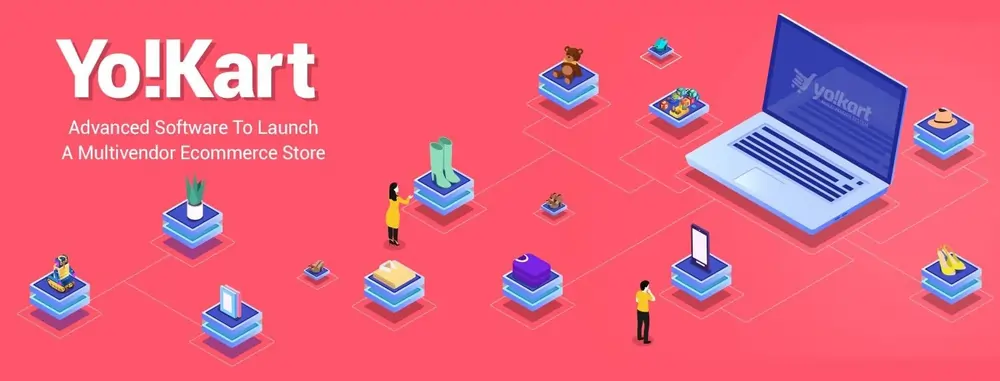
Yo!Kart is a cloud-based customizable and best multi vendor eCommerce platform. It is best for startups, small and medium-sized businesses. It helps you to launch your own marketplace efficiently and easily. The best thing about Yo!Kart is that it allows you to launch any online marketplace like eBay, Amazon, etc.
Further, Yo!Kart is self-hosted, and you install it on the server of your choice. No need for any plugins. It has complete solutions for B2B multi vendor marketplace and B2C niches. Also, it has been tested by more than 1 million products and 250 concurrent users.
Features
- SEO-friendly architecture
- Support for digital products
- User-friendly mobile and web apps
- Multiple storefront themes
- Flexible payment options
Pros
- Excellent customer support
- Easy-of-use
- Custom features implemented fast
Cons
- No upgrade available
- Minor bugs
Pricing
The pricing plan for the best platform for multi-vendor marketplace Yo!Kart is mentioned below:
| Plans | Fees |
|---|---|
| GoQuick | $999 (lifetime ownership) |
| GoQuick Boost | $2499 (lifetime ownership) |
| GoCustom | $6,499 (lifetime ownership) |
| V10 | $149 (lifetime license) |
7. Arcadier
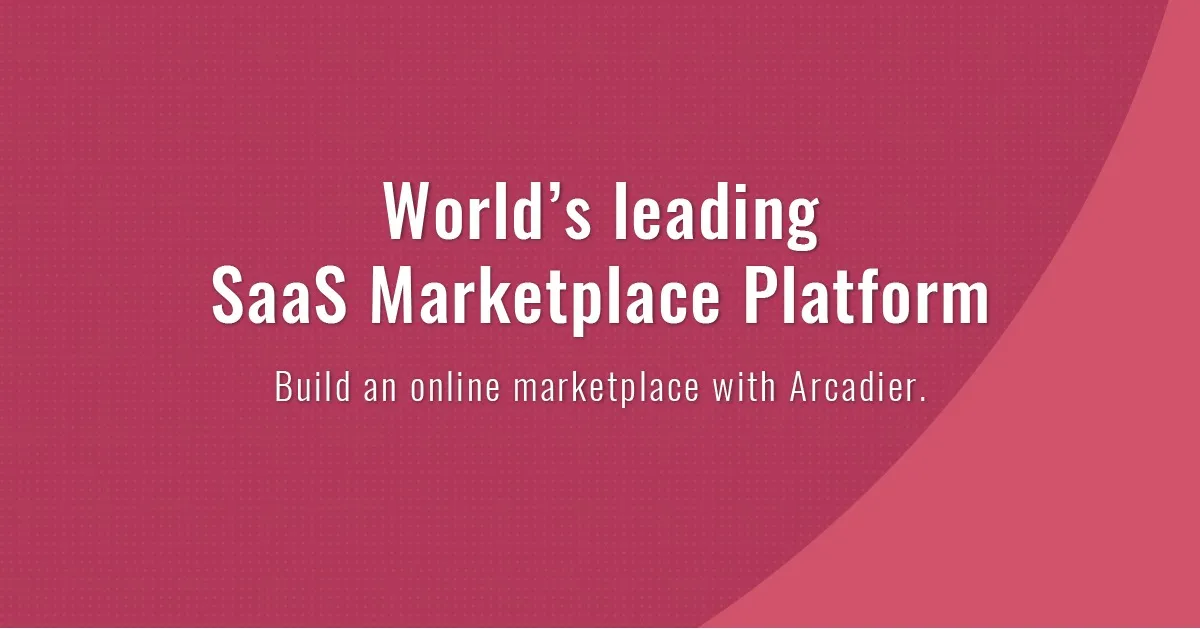
Arcadier is the best platform for multi vendor marketplace. It is a no-coding platform. It helps local communities, enterprises, SMEs, and government agencies easily build and manage the ecommerce platform for multi vendor.
In addition, it provides several features that help users grow their marketplace. Its user-friendly interface allows users to create their marketplace in simple steps easily.
Arcadier is best for those who can use one of their numerous pre-made templates or one of the many built-in features if they do not require something unique or do not wish to spend the resources necessary to create it.
Features
- Email management
- Custom domain
- Social media marketing tools
- Affordable monthly fee
- No transaction fees
Pros
- Customizability
- Easy setup
- Quickly create a marketplace
Cons
- Difficult in making complex customizations
Pricing
The beginning price is $79 per month ($68 per month when billed semi-annually or $60 per month when billed yearly). Every package comes with a free trial period of thirty days.
Magento Multi Vendor Marketplace
Magento is a powerful tool. It helps you to turn your websites into an automated marketplace. It helps to boost profits and sales. Several e-commerce startups have integrated it into their systems.
Below is a list of the best multi vendor marketplace for Magento.
1. CedCommerce

CedCommerce is the best choice for entrepreneurs who want to build a multivendor online marketplace. It is a powerful tool that helps you grow your online business. With CedCommerce, vendors can easily promote their goods. Also, monitor sales figures, handle orders, view sales reports, and more.
This platform offers several customization features, which include:
- Commission rates
- Vendor registration process
- Shipping rates and more
Moreover, CedCommerce multi-vendor marketplace solutions help to make it possible for users to build online multi-vendor software on top of their current eCommerce setup. It is easily integrated with other ecommerce plugins such as Shopify, Magento, etc.
Key Features
- Separate vendor profile
- Secure payment gateways
- Support for several currencies
- Import or export goods in a bulk form
- Responsive mobile and web interface
Pros
- Free trial
- Support various payment gateways
Cons
- Upgrades are not free
Pricing
CedCommerce offers various pricing plans, such as:
| Plans | Pricing |
|---|---|
| Basic | $60 |
| Platinum | $299 |
| Advance | $1600 |
You may have to pay extra to add an enterprise package to either of these deals.
| Plans | Pricing |
|---|---|
| Basic | $60 + $100 for enterprise |
| Platinum | $299 + $200 for enterprise |
| Advance | $1600 + $1000 for enterprise |
2. Webkul

Webkul is a unique solution for businesses who want to create and manage multi-vendor marketplaces hassle-free. This platform caters to several startups and established companies. In addition, it allows you to add many vendors. You can also give them control over various things, such as:
- Manage shipping
- Manage inventory
- Create seller storefronts
- Manage orders
Each vendor may add numerous commodities that can be delivered by:
- FedEx
- USPS
- DHL
- PayPal
- Stripe
- Aramex.
Features
- Review and feedback system
- Simple and fast user interface
- Customizable storefront
- Easily manage multiple sellers and their products
Pros
- Excellent documentation
- 10 days free trial
- No upfront fee
Cons
- Limited support with the free version
Pricing
Multi vendor marketplace platform Webkul has a variety of add-ons that you can buy for a fixed price to make your store better or more unique. By choosing and buying certain add-ons, you can change how your marketplace works to meet your specific needs without exceeding your budget.
3. LandOfCoder

Customers worldwide are becoming more interested in e-commerce platforms, especially Magento. As a result, Landofcoder has been slowly expanding its services to offer customers useful digital marketplace platform solutions.
LandOfCoder helps you to transform your eCommerce site into a fully functional multi-vendor marketplace. It allows you to upload products in bulk and easily control everything. With the help of LandOfCoder, you can take your eCommerce store to the next level. Moreover, it supports both customers and sellers.
Features
- Competitive price
- Easily integrate multiple payment gateways
- 30-day money-back guarantee
- Show feedback and consumer evaluation
- Multi payment gateways
Pros
- Online demo available
- Flexible compatibility
Cons
- Response time is not good
Pricing
The LandOfCoder pricing plans are:
| Plans | Pricing |
|---|---|
| Single License | $299 |
| Standard | + $249 |
| Premium | +$899 |
| Agency | +$2999 |
4. Magenest

Magenest is the popular Magento 2 multi vendor e-Commerce tool. It provides several features to its users to boost their products, purchases, and customer traffic. With this, you can systematically manage several vendors.
Features
- Easily manage orders, products, and vendors
- Allow customers to provide feedback
- Vendor verification system
- Allow customers to buy products from multiple vendors
- Fixed commission for each vendor
Pros
- Flexible architecture
- Customizability
- Scalability
- Large community
Cons
- High cost
- Technical expertise required
Pricing
The Magenest offers various pricing plans according to your requirements.
5. Magetop

Magetop is one of the most amazing Magento 2 multi vendor platforms. It provides many features that turn your website into a functioning e-commerce website like Alibaba, Etsy, etc. You can easily manage your products hassle-free.
You only pay once to use Magetop for life. Also, it’s a risk-free investment because their support policy gives you a 30-day money-back guarantee, one year of free help, and free updates for life. Magetop will keep making your goods better and coming up with new ideas.
Features
- Charge commissions for each seller and vendors
- Responsive seller panel
- Helps a large number of sellers and vendors
- Flexibly manage your products
- Manually or automatically approve vendor products
Pros
- Excellent features
- Complete control of your sellers/vendors and their products
- Instant support
Cons
- A little pricey
Pricing
Magetop can be purchased for a starting price of 299$. However, it is based and varies according to your requirements.
Multi Vendor Marketplace Shopify
Shopify is the number one e-commerce platform for all businesses of several industries. You can easily grow your business with Shopify. It meets the demands of Shopify vendors, whether they’re in electronics, beauty, fashion, or another industry.
Here are some great multi vendor Shopify marketplace platforms.
1. ShipTurtle

ShipTurtle helps you transform your e-commerce store into a marketplace in minutes. With the help of this platform, you can easily expand your product range by partnering with brands. It is trusted by more than 1,000 D2C brands and marketplaces worldwide.
With its white-labeling solution, you’ll put your brand in the spotlight and eliminate Shipturtle’s from all unique pages, including vendor registration, vendor login, and shipment tracking. Not only that, but vendors can change the URL they use to access the app from the default app.shipturtle.com to whatever URL best fits your brand.
Each “Vendor page” has an option that lets customers email the vendors if they have any questions. The customer and the vendor can both communicate through the Chat feature in the Shipturtle app.
Features
- Payout integrations
- Shipping profiles
- Order managed by several stages
- Complete scalability
- Easily set up many shippers
- Inventory management
- Data security
- Vendor onboarding
- Warehouse automation
Pros
- Free version for up to 100 monthly orders
- Lots of features under one roof related to shipments
Cons
- Only suitable for marketplace businesses
Pricing
The ShipTurtle pricing plan is as follows:
| Plans | Pricing |
|---|---|
| Startup | $19 |
| Business | $29 |
| Enterprise | $69 |
2. Onport
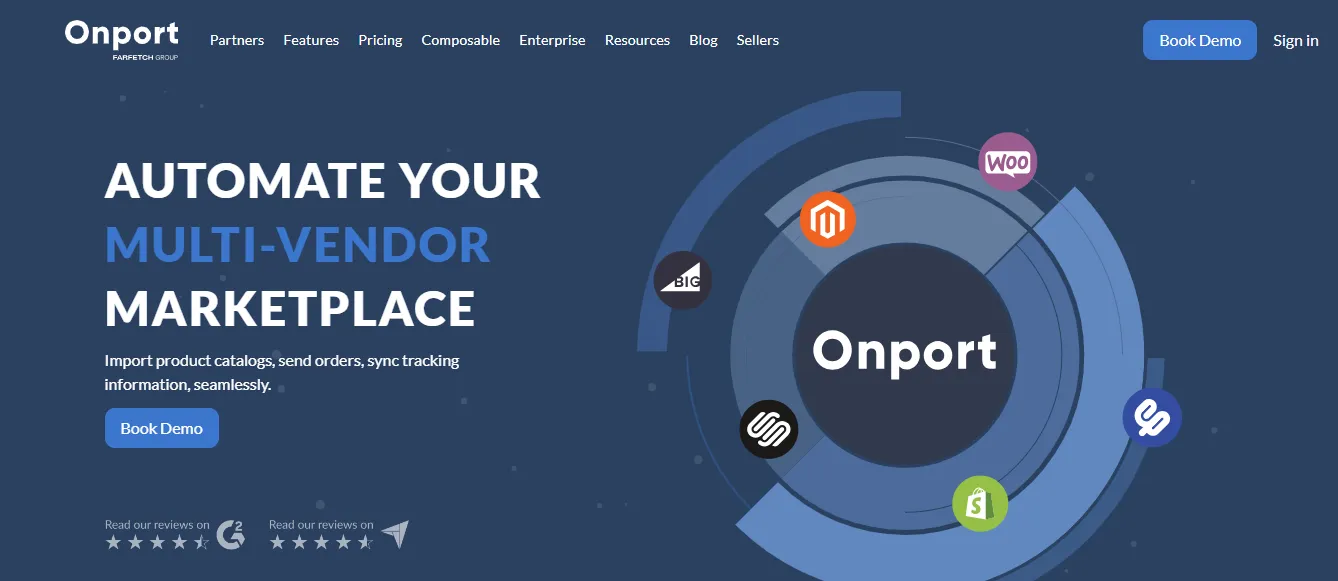
Onport automates your multi vendor marketplace. The Onport marketplace plugin integrates all main platforms, automates merchant payments, and syncs inventory. Integrate effortlessly with vendor online shop CSV or XML feeds. Automatically sync inventory, orders, and payments after publishing. Vendors can log in to a customized site to send orders, verify payments, and verify customer information.
Features
- Payment automation
- Order routing
- Inventory syncing
- Catalog management
- Integrations with certain vendors
Pros
- 12,000+ trusted vendors
- Flexible platform
- The support team is available
Cons
- High price
Pricing
The Onport offers three pricing plans, which include:
| Plans | Pricing |
|---|---|
| Standard | $19 |
| Advanced | $29 |
| Plus | $69 |
3. Marketcube.io

Marketcube.io is a multi-seller management solution. It helps marketplace operators run and automate their businesses efficiently. It also helps to manage inventory, shipping, payouts, and order splitting.
Marketcube.io helps over 1,500 companies run multi-seller marketplaces globally, from real estate to fashion to art and pharmaceuticals.
Features
- Product management
- Time-based services
- Drop-shipping
- Accounting & payouts
- Allow integration to third-party platforms
- Order and return management
- Seller management
Pros
- Minimal risk
- Globally trusted
- Create your branded marketplace in 30 minutes
Cons
- Limited customization
- Minor technical issues
Pricing
The app only costs $10 per month, and some of its benefits cost extra.
4. Duoplane
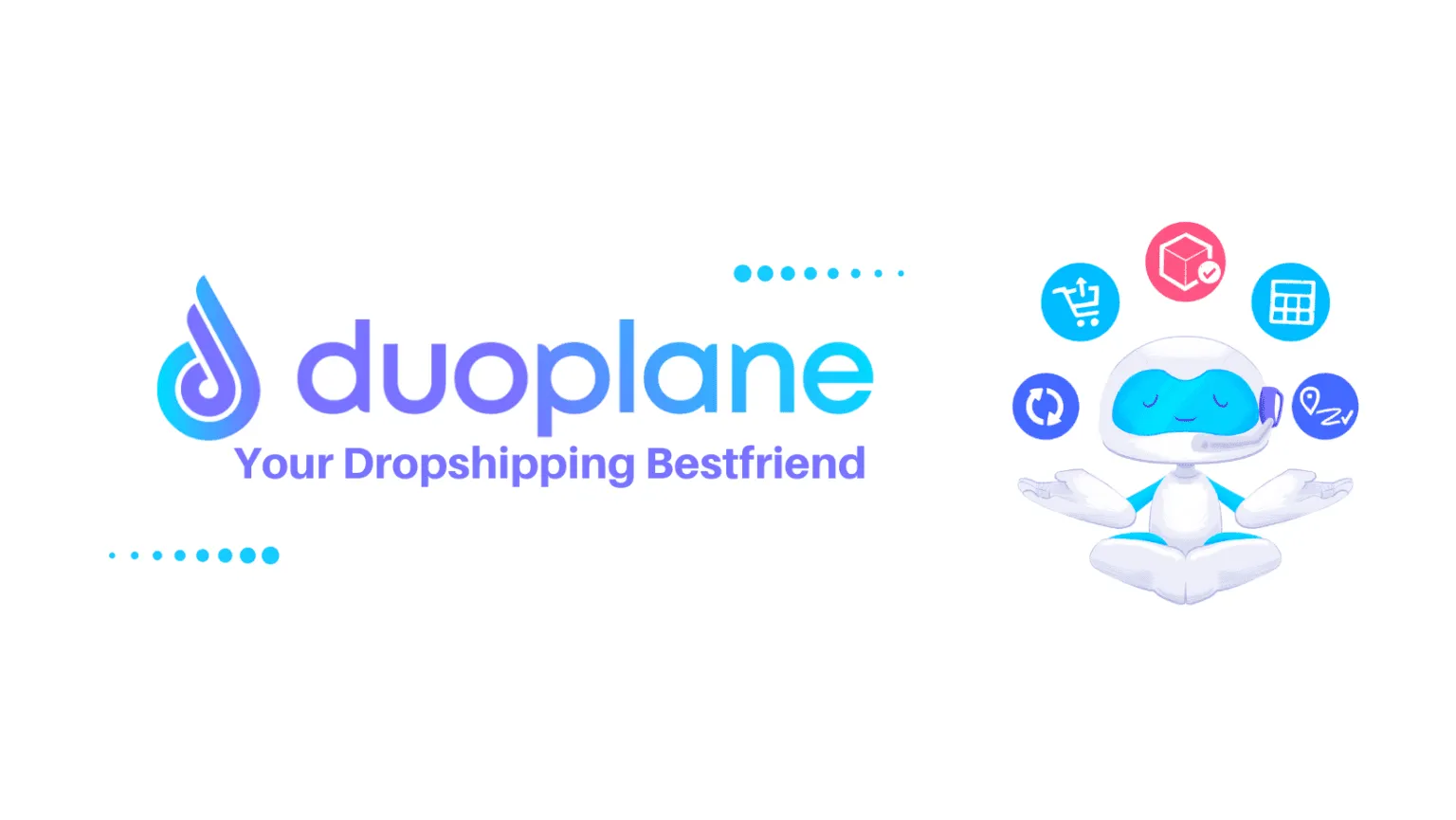
Duoplane is an automation dropship software for vendors and retailers. It allows you to strengthen relationships and scale your business operations. Plus, it lets you connect your Duoplane account to your Shopify store. So, you can communicate with all your dropshipping suppliers and 3PL warehouses automatically.
Features
- Automate orders to multiple vendors
- Automate accounting and payments
- Manage supply chains of e-commerce businesses
- Streamline the tasks
- Easily integrate with other plugins
Pros
- Excellent customer support
- Great functionality
Cons
- Scalability challenges
- Integration complexity
Pricing
You can automate your eCommerce operations with Duoplane. Below is the pricing plan for Duoplane.
| Plans | Pricing |
|---|---|
| Standard | $299 per month |
| Professional | $599 per month |
| Premium | $1199 per month |
| Enterprise | Price according to your business plan |
5. Vendor Consignment

This great tool could make a big difference in handling vendor commissions and reports. You can easily keep track of vendor fees and see payment records with vendor consignment. Since payments are made through PayPal, you can be sure that the money going to your vendors is safe.
You can also monitor how much sellers are paid and automatically track commissions. There are download choices that let you change the data and pull out useful information for analysis when you want to get the information into a third-party program.
Features
- Automatically calculate vendor commissions
- Override the commissions on an order-by-order basis
- Allow the vendor to view their own orders
- Easy to use
- Helps you to automate your consignment business
Pros
- Cost-effective
- Streamline operations
Cons
- Cash flow issues
Pricing
They offer a 14-day free trial. The prices are based on your needs.
WordPress Marketplace Theme
Several WordPress marketplace themes can help developers create a visually appealing and feature-rich online marketplace. The WordPress themes are designed to work with various plugins, such as Dokan, WooCommerce, and others.
Below are a few popular WordPress marketplace themes:
1. Martfury
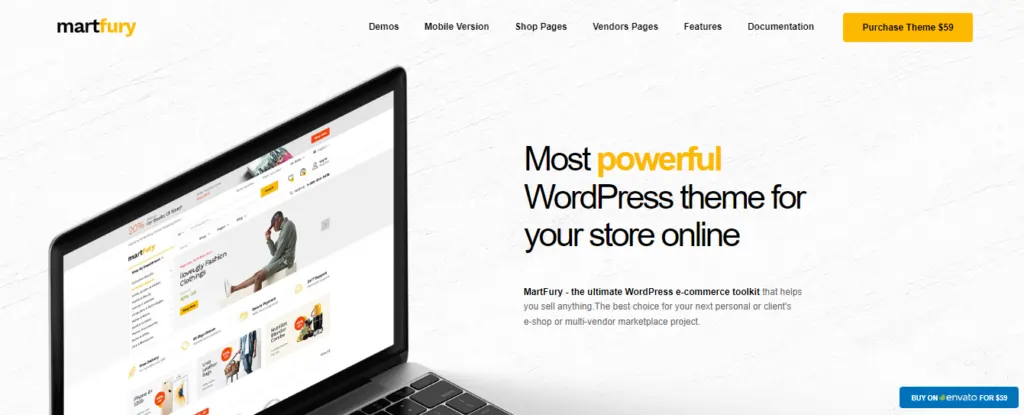
Martfury is a marketplace WordPress theme. The theme has an easy-to-use WooCommerce plugin. With Martfury, you can effortlessly and quickly create a multi vendor solution, furniture store, electronics store, clothing store, etc.
In addition, Martfury has all the necessary plugins and impressive ready-to-use demos that help you create a great web platform. This theme is suited for
The main features of Martfury are:
- Order tracking
- Responsive ready
- Translate ready
- Unlimited Shop Layout
- Reliable support
- SEO ready
Pros
- Customizable design
- Regular updates and support
- Integration with WooCommerce
Cons
- Dependency on third-party plugins
- Compatibility issues
2. Urus

Urus is the best theme with a modern, minimalistic design for online shops. This tool offers 30+ pre-defined demos, all easy to use and fully customizable. Urus offers 4 footer styles, 6 blog options, 20 product page design options, 16 header styles, and many color and font options.
Urus main features are:
- Google fonts
- Custom colors
- Infinite scroll
- One-click install
- Demo import
- Translation ready
- Mega menu
Pros
- Customization
- Get instant support
Cons
- High price
3. Cartzilla
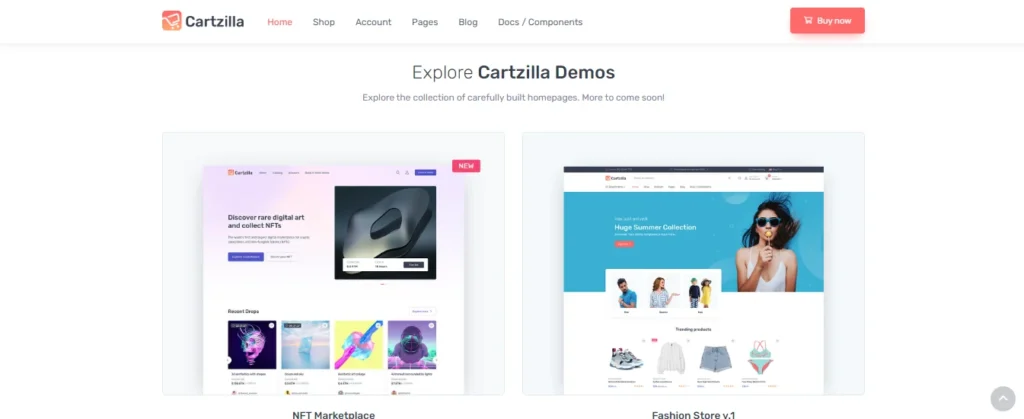
Cartzilla is the all-around WordPress theme and is 100% customizable. It is one of the best solutions for building marketplace websites. Cartzilla is a powerful e-commerce front-end solution based on Bootstrap 5. With Cartzilla, create a sophisticated online platform for selling products or even a general marketplace.
The main features included in Cartzilla are:
- 40+ flexible components
- User-friendly interface
- Google interface
- Touch-enabled sliders
- Detailed documentation
- Ajax search
- Advanced styling
Pros
- Detailed documentation
- Offer free trial
- Live demo
Cons
- Complexity
- Cost
4. Besa
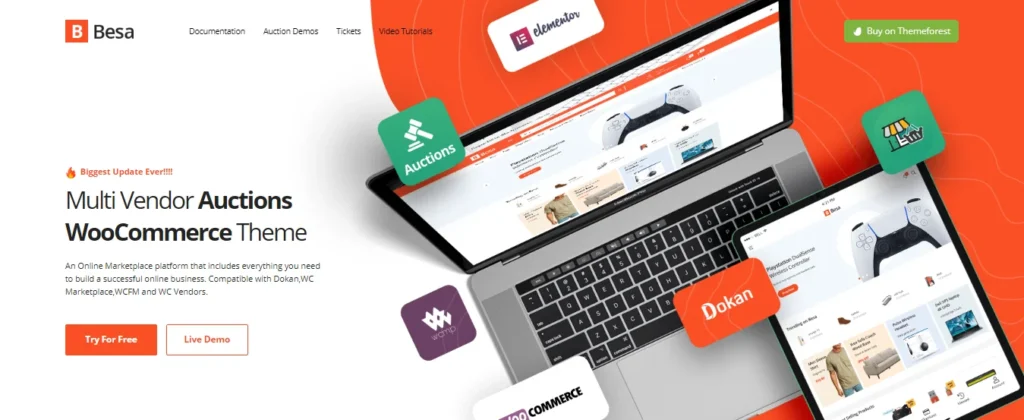
Besa is a professional WordPress theme for online eCommerce platforms. The theme is optimized for Elementor, so building a website will be easier and faster. It is suitable for any online store. With Besa, you do not need much work with the pre-defined home and index layouts.
Besa is well-known for these things:
- Multivendor compatibility
- Mobile optimized
- User-friendly and interactive searches
- Ajax mini cart
- Vertical menu
- Flexible theme options
Pros
- Demo available
- Zero coding required
- Eliminate the need for multiple plugins
Cons
- Limited customization
5. Stocky

Stocky theme helps you find the photos, images, or other digital assets you’re looking for. Its layout is easy to navigate, and you can present your photos and images neatly with the auto-generated product gallery. The Stocky theme includes these features:
- Full responsive layout
- High-quality image previews
- Integration with secure payment gateways
- Responsive design
- Advanced search filters
- Translate the website into any other language
Pros
- Hosting flexibility
- Great customer support
- Comprehensive documentation
Cons
- Limited payment options
How to Set Up a Multi-Vendor Marketplace?
Starting a multi-vendor marketplace can be an exciting venture. It involves creating a platform where multiple sellers can showcase and sell their products or services.
Here are the steps to help you get started.
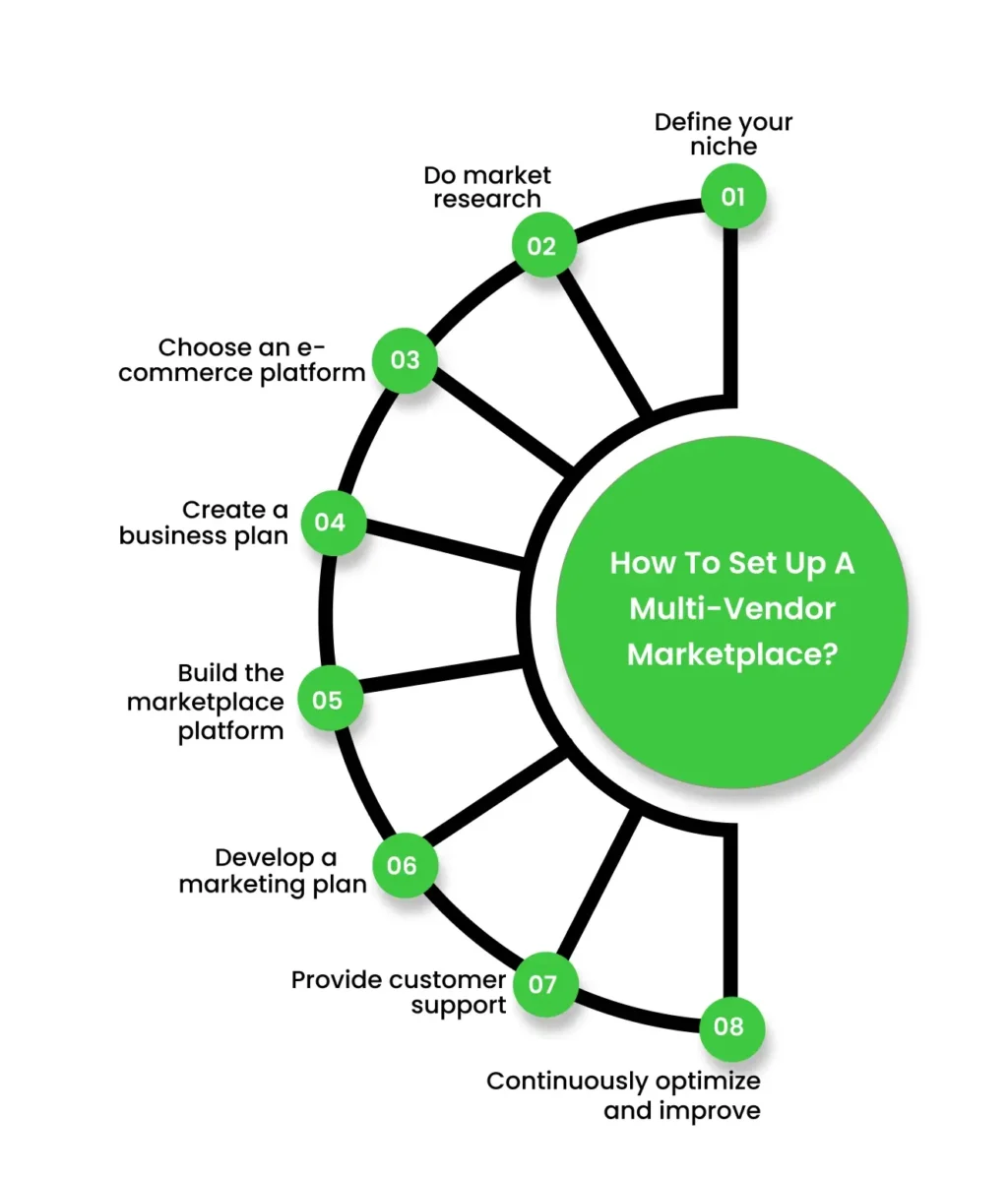
1. Define your niche
Determine the target market and niche for your marketplace. Consider which products or services will be offered and identify the specific audience you want to attract.
2. Do market research
Conduct market research to understand the demand for your marketplace. Identify potential competitors and analyze their strengths and weaknesses.
3. Choose an e-commerce platform
Select a suitable e-commerce platform that supports multi-vendor functionality. Some popular platforms include Magento, WooCommerce, Shopify, and OpenCart.
4. Create a business plan
Outline your marketplace’s goals, revenue model, marketing strategies, and operational processes in the business plan.
5. Build the marketplace platform
Hire a web developer or a development team to build your marketplace platform. Ensure that the platform includes essential features such as seller registration, product listing, shopping cart, payment gateway integration, customer reviews, search functionality, and order management.
6. Develop a marketing plan
Create a marketing plan to attract both sellers and buyers to your marketplace. Promote your platform on various channels such as social media.
7. Provide customer support
Offer efficient customer support to address any queries or issues from sellers and buyers. Promptly respond to inquiries and strive to provide excellent customer service to build trust and loyalty.
8. Continuously optimize and improve
Regularly monitor and analyze the performance of your marketplace. Gather feedback from users and make improvements to improve the user experience. Stay updated with the latest market trends and technology advancements to stay competitive.
Benefits of the Best Multi Vendor Platform
Here are some benefits of a multi-vendor marketplace.
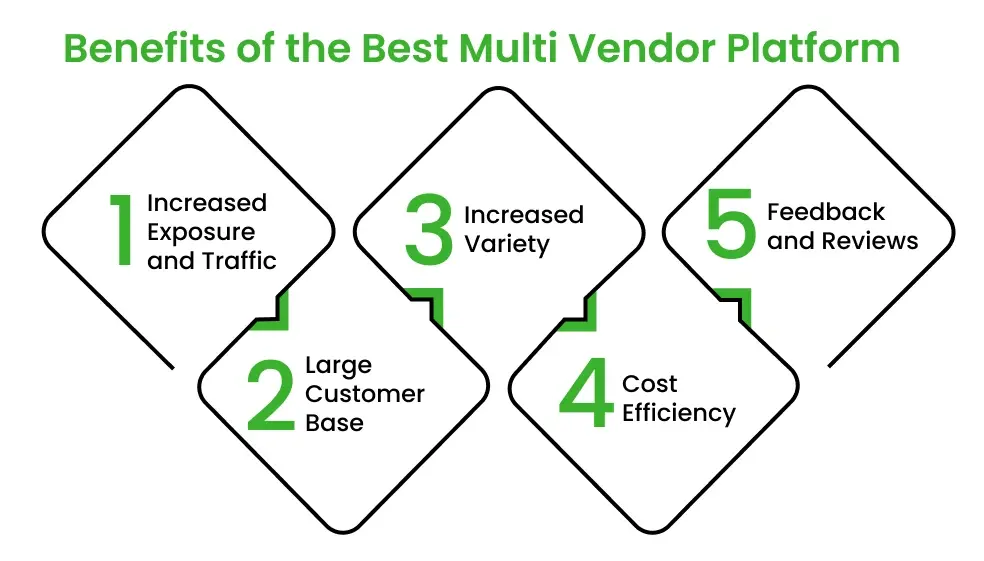
- Increased Exposure and Traffic
Most of the time, a well-established multi-vendor platform has more visitors than individual vendors’ websites. This can help potential customers discover a vendor’s products, increasing sales possibilities.
- Large Customer Base
The marketplace already has a customer base that vendors can use to reach a bigger audience without starting from scratch. This can help sales and growth happen faster.
- Increased Variety
Unless you’re selling something unique, people will want options. And you can easily offer that in your store; you get goods from multiple vendors instead of just one.
- Cost Efficiency
Joining a multi-vendor marketplace can be cheaper for sellers than creating and keeping their e-commerce websites. The marketplace takes care of sellers’ infrastructure, technology, and marketing costs.
- Feedback and Reviews
It is the best benefit that customers leave reviews and feedback. Their feedback helps vendors to improve and build their reputation. Also, it helps them to improve their offerings based on customer input.
How Much Does It Cost to Build a Multi Vendor Marketplace?
The table below outlines the potential costs associated with building a multi-vendor marketplace.
| Cost Component | Estimated Cost Range | Description |
| Domain Name | $10 – $50 per year | Cost for purchasing a domain name for the marketplace. |
| Hosting | $20 – $500 per month | Monthly fees for web hosting services, depending on traffic. |
| Website Design | $500 – $5,000+ | Costs for custom design or templates, including UI/UX. |
| Development | $5,000 – $100,000+ | Costs for building the platform can vary widely based on complexity. |
| Payment Gateway | $0 – $500+ | Fees for integrating payment solutions (transaction fees may apply). |
| Security Features | $500 – $2,000 | SSL certificates, firewalls, and other security measures. |
| Marketing | $1,000 – $10,000+ | Initial marketing and advertising costs to attract vendors and customers. |
| Maintenance | $100 – $1,000+ per month | Ongoing costs for updates, bug fixes, and server maintenance. |
| Legal Fees | $500 – $3,000 | Costs for contracts, terms of service, and compliance. |
| Other Tools & Software | $100 – $1,000+ | Costs for additional tools like CRM, analytics, etc. |
How to Choose the Best Online Multi Vendor Marketplace Platform for Your Business?
Selecting the best platform for a multi-vendor marketplace for your business is important. It can help you to grow your business and impact your success. However, choosing a platform could be hard because there are so many to choose from.
Therefore, for your help, we gathered some tips to help you make a better decision.
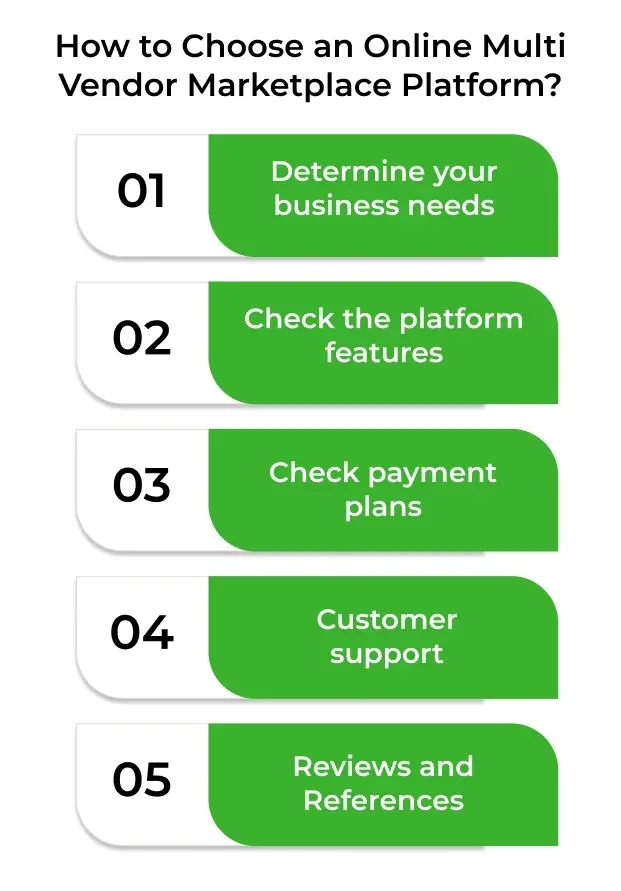
Determine your business needs
First, you must identify your business goals. Also, the types of products, target audience, and services you offer.
Check the platform features
Look for the platform’s features. Plus, see that they meet your business needs.
Check payment plans
Don’t forget to check prices. Some charge a monthly fee, while others take a percentage of sales. Consider both upfront costs and long-term expenses.
Customer support
Always check customer support. The responsive support team addresses your issues and concerns quickly.
Reviews and References
You can read reviews online. Read what others say about this platform. It can help you to make a better decision.
Case Study of Successful Multi-Vendor Marketplace
Amazon is a great example of a successful multi-vendor marketplace. It started as an online bookstore but quickly expanded its offerings to become the world’s largest e-commerce platform.
Today, Amazon serves as a global marketplace connecting millions of buyers and sellers across various product categories.
Let’s take a closer look at the success factors of Amazon as a multi-vendor marketplace.
Wide Product Selection
One of the primary reasons for Amazon’s success is its extensive product selection. Amazon offers a vast range of products, including home goods, electronics, books, clothing, and more.
Third-Party Seller Program
Amazon’s third-party seller program plays a pivotal role in its marketplace success. The program enables independent sellers to list and sell their products directly on Amazon. It provides sellers with access to a large customer base.
Customer Trust and Satisfaction
Amazon has built a strong reputation for customer trust and satisfaction. It prioritizes customer experience by providing a user-friendly interface, customer reviews, and detailed product descriptions.
Supercharge your deliveries with Enatega.
Get Started NowFAQs
1. Is multi vendor marketplace profitable?
Multi-vendor marketplace platforms are profitable. However, choose the one that best matches your requirements.
2. How do I start a multivendor website?
Below are some steps to help you start a multivendor website.
- Determine your niche
- Find the online vendors
- Attract buyers
- Focus on your customers and vendors
3. What is the cheapest online marketplace?
The cheapest online marketplaces are Facebook Marketplace and Craigslist.
4. Can I sell on multiple marketplaces?
Selling on multiple marketplaces will allow you to utilize the greatest features of each platform.
5. What is single vendor and multi-vendor?
A single vendor is a marketplace website where a single seller sells to several buyers. In contrast, a multi-vendor marketplace has multiple suppliers and multiple consumers.
6. Which online marketplace is best?
The best online marketplace software is feature-rich, scalable, and user-friendly for you and your merchants. We recommend the Enatega multivendor platform for the food delivery business.
7. What is a peer-to-peer marketplace?
A decentralized peer-to-peer marketplace allows two people to buy or trade goods or services.
8. Which platform is best for multi vendor marketplace?
Below is the list of best multi vendor marketplace platforms.
- Dokan
- Yo!Kart
- Enatega
- Arcadier
- CedCommerce
9. Which e-commerce platform allows multiple vendors?
The top e-commerce platforms that allow multiple vendors are Amazon, Etsy, Foodpanda, Enatega, and Swiggy.
10. What is the difference between single vendor and multivendor marketplaces?
In a single-vendor marketplace, businesses have a website or app to manage every aspect. On the contrary, in the multi-vendor marketplace, the marketplace owner maintains the website while vendors sell.
11. Is Shopify good for multi vendor?
Shopify can support multi-vendor setups through apps like “Shopify Marketplace” or “Multi Vendor Marketplace,” but it’s primarily designed for single-store management, so it may require additional customization for extensive multi-vendor features.
12. How much does the Marketplace take from sales?
Marketplace fees can vary widely depending on the platform and its pricing structure. They range from 5% to 20% of the sale price, with some marketplaces also charging listing fees or subscription costs.
Conclusion
The first step is to get the right platform, no matter what business model you want to use for your online store or how you want to make money from it. Nowadays, multi vendor marketplace platforms are best for eCommerce vendors to boost their business. Each platform discussed above offers distinct features and caters to different business needs. Therefore, carefully evaluate your business needs. Then, choose the platform that aligns with your goals.
So, consult Enatega if you want the single vendor and the multi vendor marketplace platform for your food delivery business.








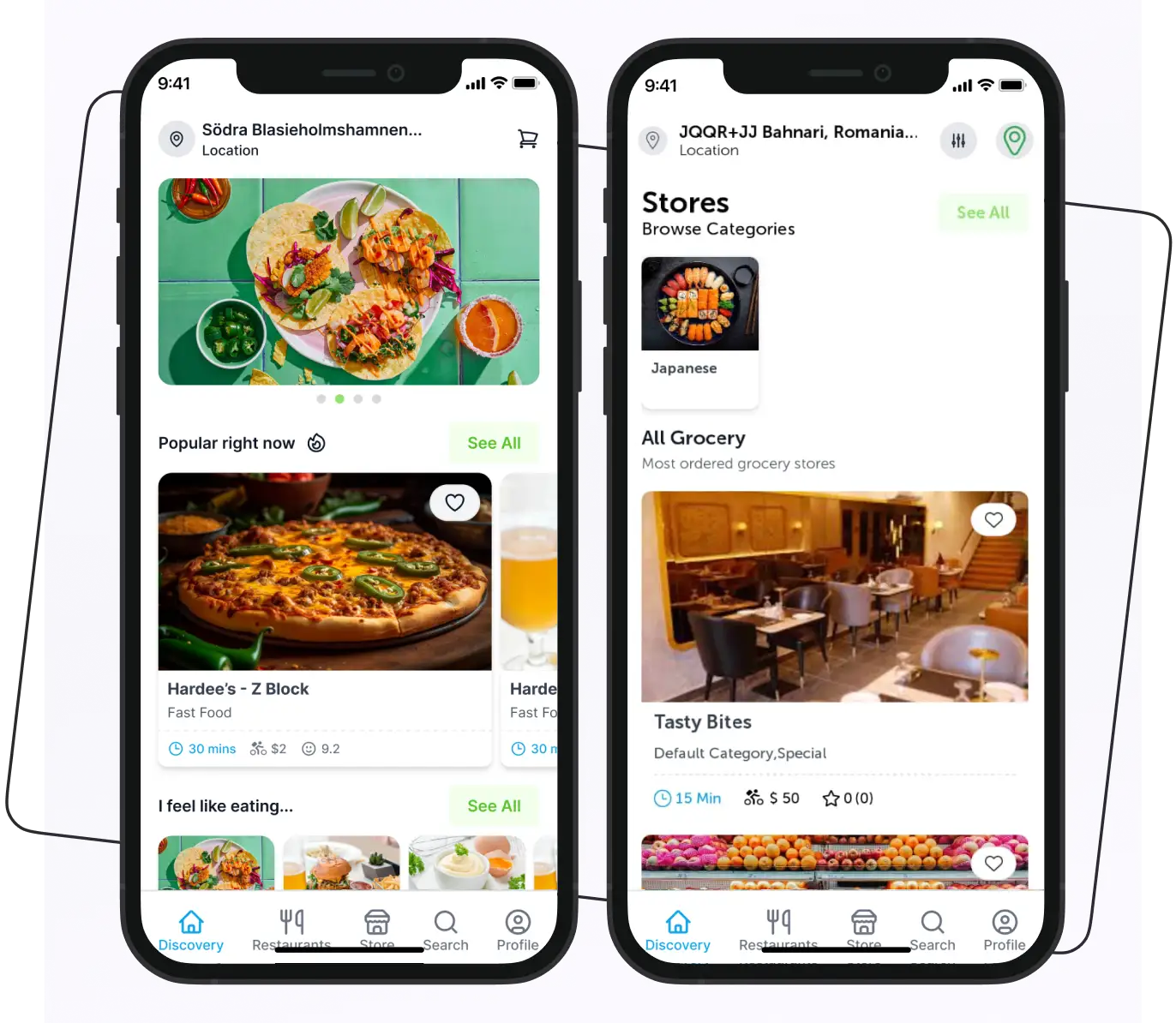
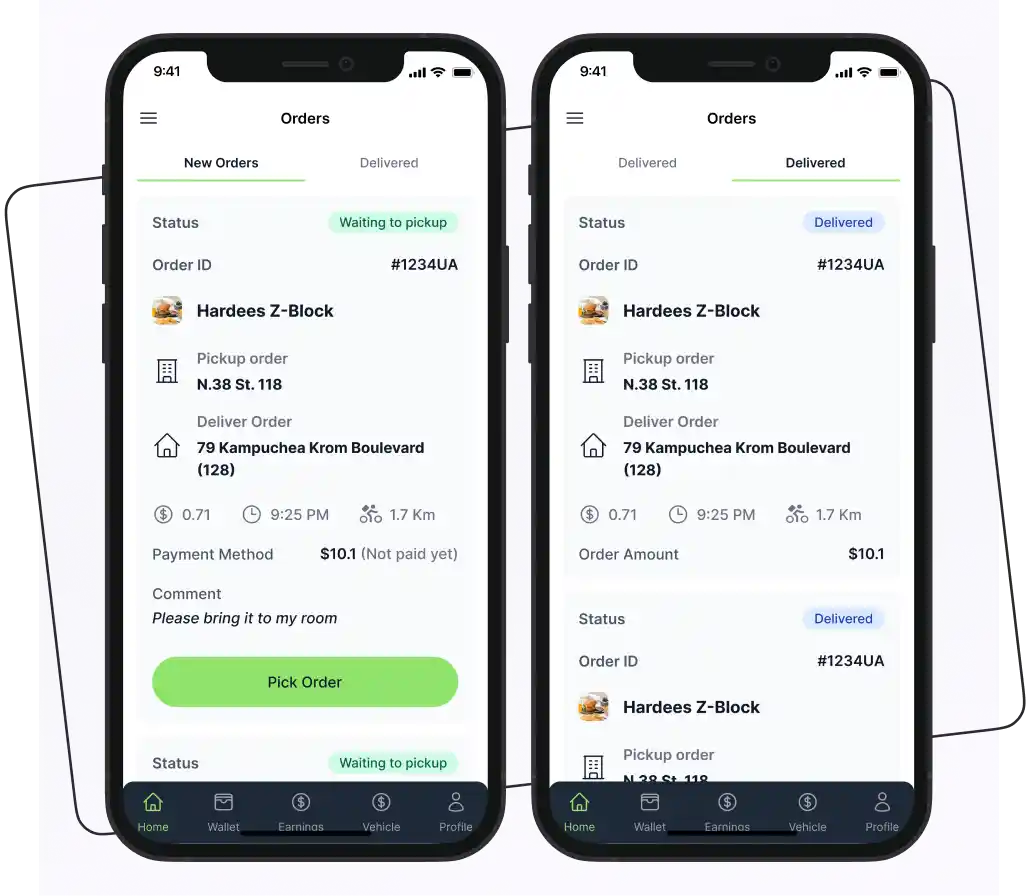
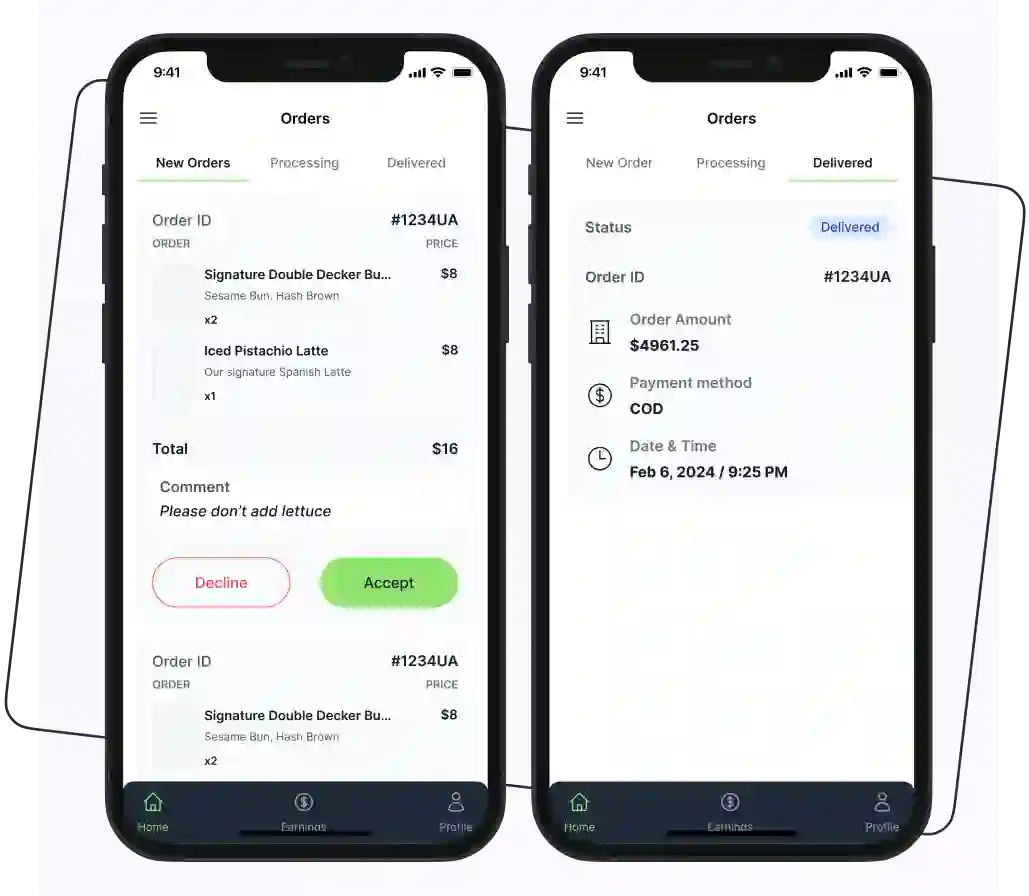
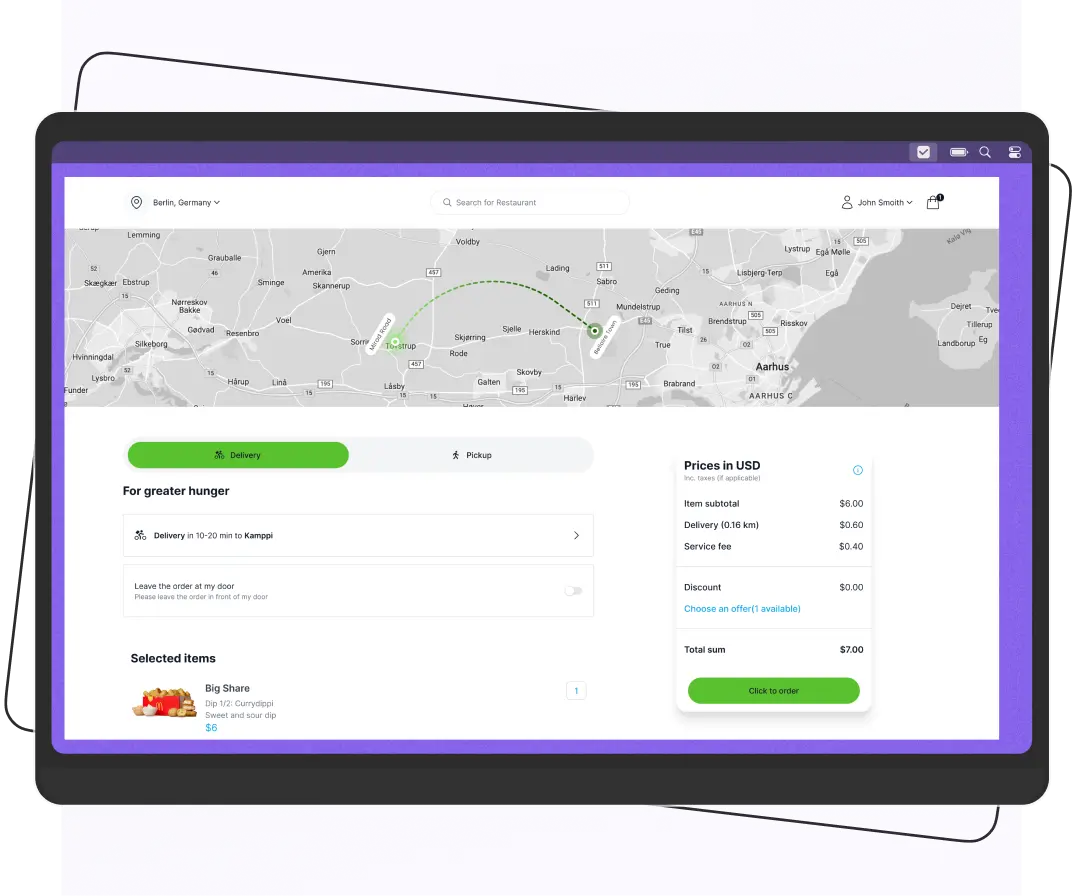
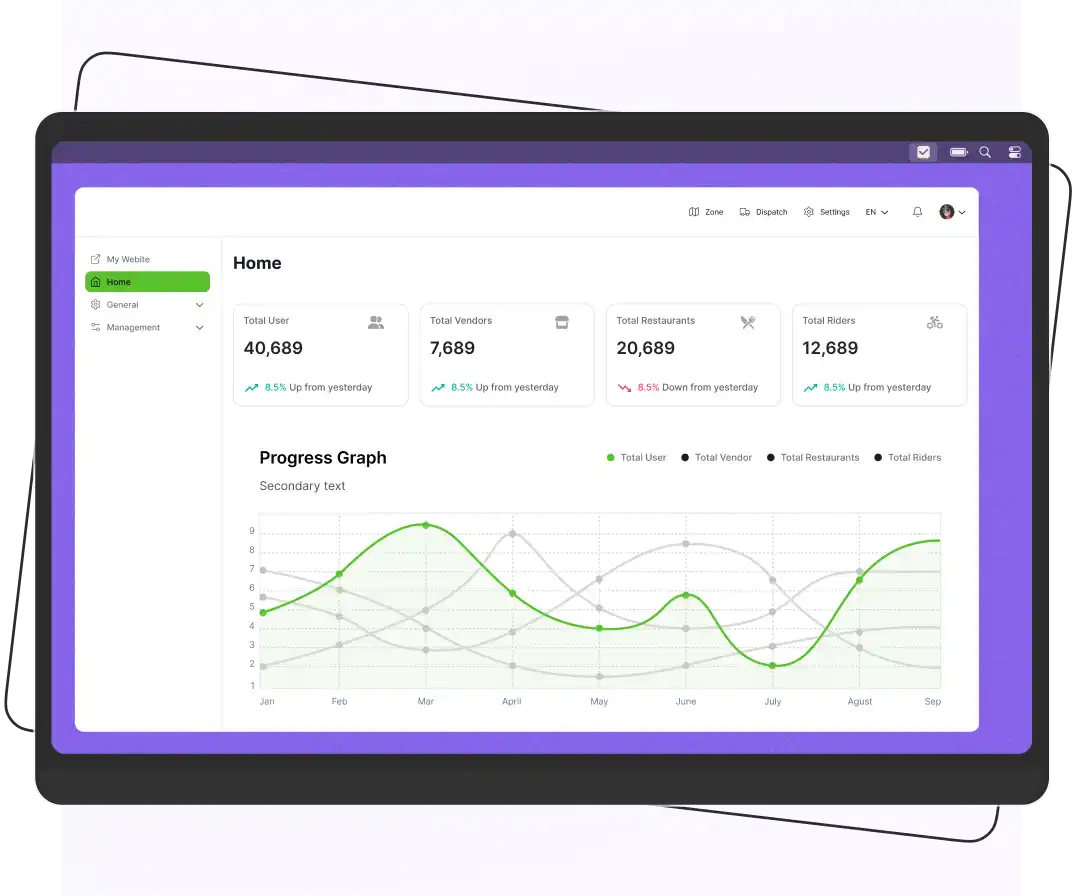



2 responses to “Top Multi Vendor Marketplace Platforms to Use in 2025”
[…] have become an essential tool for businesses to reach a wider audience and increase their sales. A multi vendor marketplace platform is a type of e-commerce platform that allows multiple vendors or sellers to sell their products or […]
[…] in embracing technology. And one tool that has been revolutionizing the food industry is the multi-vendor marketplace platform. By harnessing its power, restaurants around the world are experiencing unprecedented growth and […]